
Walter Benjamin’s membership card from the Bibliothèque nationale de France. Public domain, via Wikimedia Commons.
Take, as a foundation, the image of women carrying full, heavy vessels on their heads without using their hands.
The rhythm in which they do this is what the proverb demonstrates.
A noli me tangere of experience speaks from the proverb.
And through this, the proverb declares its ability to transform experience into tradition.
Proverbs cannot be applied to a specific situation. Rather, they have a kind of magical character: they transform the situation. An individual hardly has the capacity to cleanse all the traces of personal experiences from the lessons learned in life. But proverbs can do this by appropriating those lessons.
Proverbs turn knowledge gained from experience into a wave in the endless, breathing chain of life lessons that come to us from eternity.
Jean Paulhan: Expérience du proverbe.
—Translated from the German by Tess Lewis
Walter Benjamin (1892–1940) was a philosopher, cultural critic, and essayist. Associated with the Frankfurt School, Benjamin influenced many of his contemporaries, including Bertolt Brecht, Gershom Scholem, and Theodor Adorno. Benjamin’s best-known essays include “The Task of the Translator,” “The Work of Art in the Age of Mechanical Reproduction,” and “Theses on the Philosophy of History.” In 1940, he died by suicide in Portbou, on the French–Spanish border, when his attempt to escape Nazi forces was thwarted.
Tess Lewis has translated works from the French and German, including books by Peter Handke, Anselm Kiefer, Philippe Jaccottet, and Christine Angot. Her awards include the 2017 PEN Translation Prize and a Guggenheim Fellowship. She serves as the cochair of the PEN Translation Committee and is an advisory editor for The Hudson Review.
From The Storyteller Essays, by Walter Benjamin, translated by Tess Lewis, published by New York Review Books. Translation copyright © 2019 by Tess Lewis.
from The Paris Review https://ift.tt/2z2kBfd
Comments
Post a Comment